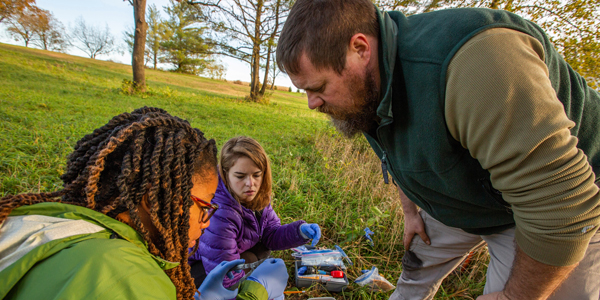
Energizing Emerging Wildlife Biologists
Michael Rentz’s academic interest in how land use affects plant and mammal abundance developed when he was a child.
“Most of the area around my home in Minnesota was either farmland or woods and streams,” he says. “I spent hours tromping around by myself. Those woods played a large role in teaching me
to answer my own questions through observation and reading.”
Now an assistant teaching professor for the Department of Natural Resource Ecology and
Management (NREM), Rentz says the rest of his school years after he moved to Mankato following sixth grade, “were spent in an ecologically desolate neighborhood that housed nary a wild squirrel, much less a boundless forest all my own. My fear of losing my former chunk of nature to development is what drove me to issues of land use, conservation, preservation and sustainability.”
In May 2014, Rentz earned a doctorate at the University of Minnesota in conservation biology
and was hired by Iowa State NREM to teach. His course roster now boasts 10 different classes, some co-taught with colleagues. Three involve taking small groups of students to Wyoming
and Montana. One is an annual spring break trip to Yellowstone National Park.
Rentz is involved in two courses at the Rod and Connie French Conservation Education Camp.
The facility, located 50 miles west of Missoula, Montana, is operated by NREM for hands-on field education in forestry, fisheries and wildlife. For the past three summers, a course on wildlife population methods has been held at the camp.
“It is a field-technique-heavy course that can substitute for an on-campus course in the fall,” Rentz says. “It is three weeks of actually doing science and learning by doing.”
In August 2019, Rentz was one of four professors involved in the first multidisciplinary experience for animal ecology majors interested in the department’s wildlife option.
“We took 12 students to French Camp for two weeks of data collection and field experience followed by a half semester on-campus analyzing our data and samples,” Rentz says.
“We hope to expand this course in the future.”
Students are quick to praise Rentz for his teaching style and dedication to students. Zoe Houseman, a sophomore in animal ecology, has taken several of his classes, including
the two offered at the French Camp in Montana.
“Mike wants us to get as much hands-on experience as possible. We backpacked over 35 miles in Glacier National Park to do loon surveys, and we completed a ‘mark and recapture’ on deer mice to find the population size in a specific area,” Houseman says. “Having the opportunity to take these classes with such a great professor allowed me to discover my personal interests and find my career path.”
Rentz clearly enjoys what he does.
“I love watching students grow,” he says. “I love the energy and joy of students when they get to try something for the first time. Often, they have been dreaming about their careers for years, and the first time they get to do science on their own is magical.



